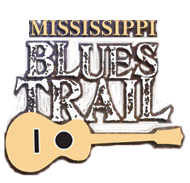Kilmichael: B.B. King’s Roots
Kilmichael: B.B. King’s Roots - Kilmichael
Riley B. King, who was born in the Delta fifty miles west of here in 1925, spent many of his formative years in Kilmichael in the 1930s and ‘40s before achieving stardom as “B. B.” King. His first mentor on the guitar was the Reverend Archie Fair, who played while preaching at a local church. King credited his teacher at the one-room Elkhorn School, Luther Henson, with instilling in him dignity, independence and hope, qualities that served King well during his long career.
B.B. King is most often associated with his adopted “hometown” of Indianola, but it was here in Kilmichael, in Mississippi ’s hill country region, that he first decided to pursue music. King was born in tiny Berclair, and following the breakup of his parents, Albert and Nora Ella, when he was four years old, he and his mother moved to Kilmichael. He lived here mostly with her mother, Elnora Farr, who was a sharecropper on the farm of Edwayne Henderson, where young Riley also picked cotton. Farr, whose maiden name was Davidson, was born in Chickasaw County in northeast Mississippi, and was related to bluesman Booker “Bukka” White. As a child King met White and saw him perform. King would later live with White during his first stay in Memphis.
King recalled that he first heard the blues in Kilmichael via the unaccompanied singing of various agricultural workers and his uncle “Big Jack” Bennett, who was married to his mother ’s sister Nevada. He also regularly visited the home of his Aunt Mima (or Mimy), who had a phonograph and blues records by Blind Lemon Jefferson and Lonnie Johnson, both important influences on King ’s later music. She also owned a pump organ on which King first learned about chords. The most important of King ’s musical influences in Kilmichael was the Reverend Archie Fair (c. 1909-1960), the brother-in-law of King ’s uncle William Pulliam. Fair preached at the Austin Chapel Sanctified Church. King was entranced by the dynamic quality of Fair ’s guitar playing and singing while he led services, and during a visit to King ’s home Fair let young Riley hold his guitar and showed him three basic chords. King first performed, though, as a singer, and formed the Elkhorn Jubilee Singers together with his cousin, Birkett Davis. The group was named after the Elkhorn Primitive Baptist Church, which ran the one-room schoolhouse that King attended.
King ’s life in Kilmichael was also marked by tragedy. His mother died when he was just nine years old, and his grandmother passed away when King was fourteen; both are buried in the cemetery of the Pinkney Grove Missionary Baptist Church. After his grandmother ’s death, King lived alone for a while and then with his uncle and aunt, Jack and Nevada Bennett, before moving to live with his father, who had remarried and settled in Lexington, Mississippi. He felt out of place there, however, and eventually ran away, riding his bicycle the sixty miles back to Kilmichael. He found a place to live and work on the family farm of Flake Cartledge, a white man whom King admired for his generosity, fairness and lack of prejudice. Cartledge insisted that King attend school and helped him buy his first real guitar, a red Stella, which he began playing with the Elkhorn Jubilee Singers. In 1943 King followed Birkett Davis west to the Indianola area, where they formed another gospel group, the Famous St. John ’s Gospel Singers. King later began playing blues in Indianola. After a long and storied career that took him around the world, King died on May 14, 2015. He is buried on the grounds of the B.B. King Museum and Delta Interpretive Center in Indianola.
Captions
Luther Henson, a graduate of Rust College in Holly Springs, Mississippi, taught King at a one-room schoolhouse located on the grounds of the Elkhorn Primitive Baptist Church. Henson inspired his students by teaching them about positive African American role models, using materials including the African American newspaper the Oklahoma City Black Dispatch.
This marker was unveiled on August 21, 2012. King passed away on May 14, 2015, in Las Vegas.
content © Mississippi Blues Commission
[ BACK TO TOP ]

